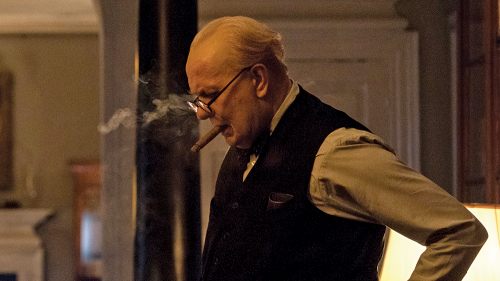Through Another’s Eyes: Joe Wright, ATONEMENT & DARKEST HOUR
Darkest Hour is in select theaters. Get your tickets here!
Joe Wright may be the filmmaker most obsessed with point of view since Brian De Palma (though it wouldn't be difficult to posit that Wright would prefer a Hitchcock comparison). His ravishing adaptation of Ian McEwen's best seller Atonement ('07) proved that point in its breathless first forty minutes, and his latest - the claustrophobic Winston Churchill biopic Darkest Hour ('17) - takes that central conceit and builds an entire motion picture around it. Where his golden-tinged melodrama forced us to witness several events through multiple sets of eyes - Christopher Hampton's script transmuting McEwen's novel into Masterpiece Theater Presents Rashomon - Darkest Hour takes Atonement's most virtuoso scene (a five-minute unbroken long shot during WWII's Battle of Dunkirk) and lets us observe Churchill's backroom orchestration to get England's boys off that beach and home safe.
In both Atonement and Darkest Hour, Wright is shifting perspectives in the name of creating suspense, but the tension that permeates the initial forty minutes of his romantic weepie work to subvert what we've come to expect from that style of chamber piece. Via the clacking of a typewriter - which composer Dario Marinelli integrates perfectly into his driving, hypnotic score - and the fluid, kinetic camerawork (courtesy of DoP Seamus McGarvey) Atonement never falls into the stuffy routine of British theater, instead taking on a distinct air of lurid pulp. Wright's interested in how Briony Tallis (Saoirse Ronan) forces a misconception of two erotic moments between her sister Cecilia (Keira Knightley) and their housekeeper's son, Robbie (James McAvoy). We know what she witnessed wasn't a crime, thanks to Wright cutting to another take on the tryst from Cecilia and Robbie's POV, but the damage is already done - Briony will seal Robbie's fate with a known falsity, rendering it all the more tragic in the audience's eyes.
Briony's lie is layered upon an actual crime that nobody - save for the audience again, thanks to Wright's omnipotent structure - could've seen coming. Lola Quincey (Juno Temple) is found on the grounds, having been assaulted by chocolate prince Paul Marshall (Benedict Cumberbatch), after the two shared a rather uncomfortable flirtation when Paul visited the girl and two twin boys (who've since gone missing). Lola knows who perpetrated her violation, as do we, but Briony's feckless crush will lead the police astray during a series of interrogations. By the time Robbie returns with the two orange-haired lads in two, the cops are ready to toss on the cuffs and cart him away, all while Briony continues to peer out from an upstairs window, looking like a twelve-year-old female iteration of Norman Bates, staring at her own Marion Crane in the shower.
Smash cut to France four years later, Robbie's relaying news that the British are looking to exit this current conflict to a few harried Frenchmen. Yet before he knows it, Robbie becomes one of the boys Churchill frets about while attempting to coordinate what will become of Operation Dynamo. In Darkest Hour, Winston navigates two political enemies - an ousted Neville Chamberlain (Ronald Pickup), and the devious Viscount Halifax (Stephen Dillane) - who are positioning the new Prime Minister to fail by pushing peace talks with the Führer on him (and quietly promising their resignation to each other should he reject them). All the while, soldiers like Robbie's Oxford-educated working class son are forever in the back of his mind, counting seconds on the clock because they very well may be their last on Earth. Suddenly, two of Wright's finest films are in dialogue with one another, producing multiple perspectives.
When watched in tandem, Atonement and Darkest Hour play like companion pieces. Wright expects us to be familiar with the historical event that acts as his setting for the five-minute technical showcase (which stands as one of the greatest long takes in cinema history). Wounded and unsure if he'll ever make it back home in one piece, Robbie wanders the sands of Dunkirk, the ostentatiousness of Wright's technique making us voyeurs within this rather grim moment in global military history. The camera's refusal to cut is like a denial of blinking, our eyes bound open and forced to witness horses being shot by soldiers, their singing and laughing comrades, and bodies writhing in agony on the beach. It's a moment no mind is soon to forget, with Wright's Darkest Hour trusting that we'll have the memory of this chaotic bit of showboating burned into our brains upon buying a ticket for his Churchill opus.
Darkest Hour is obviously not the only 2017 picture to deal with Dynamo, as Chris Nolan's time-crunching/expanding war epic has stolen headlines all year with its 70mm flamboyance. But Wright's picture offers up an equally tense depiction of what failure on those beaches would've cost the United Kingdom as a whole, both in terms of quantified lives and overall freedoms after Hitler's imminent invasion. The big story about Wright's latest is the transformative performance from Gary Oldman (and for good reason, as the storied actor may have delivered his finest turn). However, what fans of the director's entire body of work will ultimately take away is the brazen confidence of an artist obsessed with the way events are viewed by the numerous individuals who participate in them, and how that can emotionally stir us as viewers in the auditorium.



